|
|
|
Sort Order |
|
|
|
Items / Page
|
|
|
|
|
|
|
| Srl | Item |
| 1 |
ID:
180832
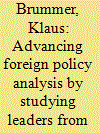

|
|
|
|
|
| Summary/Abstract |
Using the concept of ‘context sensitivity’ as organizing theme, this article explores different avenues of advancing foreign policy analysis (FPA) scholarship based on insights from the global South. Since foreign policy decision-makers in the global South operate in (at times very) different political environments than their western counterparts, the applicability of FPA approaches cannot be taken as a given, which is why their context sensitivity (i.e., the extent to which core concepts and indicators contained in those approaches travel to non-western settings) needs to be explored. This article suggests that our understanding of the motives and behaviours of individual decision-makers can be advanced in three distinct ways based on insights from the global South. First, several of the FPA constructs that focus on individual decision makers have seen hardly any applications to non-western cases, which is why the latter contributes to ascertaining the analytical scope of those constructs. Second, taking more fully into account the differences in decision-making environments within which leaders from the global South operate can advance leader-oriented FPA approaches by helping to specify certain theoretical assumptions proposed by them. Finally, the aspiration to analyse leaders from the global South can advance FPA in terms of method by, for instance, developing non-English language coding schemes for profiling leaders based on speech acts that are cognizant of the specificities of individual languages, while at the same time allowing for measurement equivalence across different languages.
|
|
|
|
|
|
|
|
|
|
|
|
|
|
|
|
| 2 |
ID:
180830
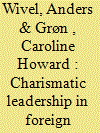

|
|
|
|
|
| Summary/Abstract |
Charismatic leadership is an integral yet understudied aspect of foreign policy in liberal democratic states. Combining insights from recent developments on charismatic leadership in organization and management studies with literature on foreign policy, we construct a novel theoretical framework for understanding how foreign policy leaders exercise charismatic leadership. We argue that charismatic leadership makes sense of who ‘we’ are and where we are going through communicative practices. We specify these practices and discuss why charismatic leadership is important in foreign policy analysis; what it is; and how and why sense-making matters for a charismatic leadership style. We contribute with new empirical knowledge by probing our theoretical propositions in a comparative case-study of the charismatic leadership practices of Donald Trump and Angela Merkel. The case-studies illustrate the importance of charismatic communication for both leaders, while disclosing variations in both the ‘thickness’ of charismatic leadership practices and their compatibility with rational legal authority and liberal democratic values.
|
|
|
|
|
|
|
|
|
|
|
|
|
|
|
|
| 3 |
ID:
180825


|
|
|
|
|
| Summary/Abstract |
Temporal considerations play a role in many models of foreign policy analysis, particularly those focused on decision-making processes. While time features prominently as a background feature against which sequence, cadence and psychological consequence are measured, little attention has been given to how foreign policy agents actively construct their temporal environments. We propose that different foreign policy-making actors develop distinct relationships with time, and that variations in these relationships can help account for the ways in which ‘events’ are transformed into routine practices, change opportunities or full-blown foreign policy crises. We advance a novel conception of time in foreign policy-making through our development of timing theory and the linguistic constructions of ‘time’ by foreign policy actors. We propose a typology of timing agency, which highlights the impact of these orientations on decision-making processes as well as the characteristics of foreign policy behaviours. Using the case of Brexit, we elaborate differences in actors' temporal orientations and show how such differences impact the making of foreign policy.
|
|
|
|
|
|
|
|
|
|
|
|
|
|
|
|
| 4 |
ID:
180835
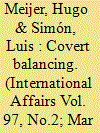

|
|
|
|
|
| Summary/Abstract |
Throughout history, Great Powers have devised balancing strategies aimed at checking the ambitions of rival Great Powers. To do that, they have sought to enter and mobilize alliances and security partnerships with secondary states. Yet, the influence of secondary states on the balancing strategies of Great Powers remains largely under-estimated in the International Relations literature. Contrary to conventional wisdom, we posit that secondary state preferences play a key enabling or constraining role in shaping the balancing choices of Great Powers. We focus specifically on how the adoption of hedging strategies on the part of secondary states affects the balancing strategies of established Great Powers. We argue that when secondary states adopt a hedging strategy established Great Powers are incentivized to engage in what we call ‘covert balancing’. Covert balancing occurs when an established Great Power conceals its security cooperation with a secondary state beneath a cover that is seemingly unrelated to balancing a rising Great Power, thus working around the secondary state's hedging strategy while at the same time helping to generate a latent capacity to balance. We probe our argument by examining US balancing strategy against China in the Asia–Pacific.
|
|
|
|
|
|
|
|
|
|
|
|
|
|
|
|
| 5 |
ID:
180834


|
|
|
|
|
| Summary/Abstract |
Following the death of George Floyd in Minneapolis on 25 May 2020, anti-racist protests occurred across America and Europe. As a result, public institutions in the UK have begun to re-examine their cultures and practices to ensure not only that they are non-discriminatory, but also that they are actively anti-racist. The Army will not be immune to this process. Indeed, senior commanders including the Chief of the Defence Staff have already embraced the ‘decolonizing’ programme. Since 2000, the Army has incorporated significant numbers of Black, Asian and minority ethnic (BAME) soldiers; just over 10 per cent of the Army is now BAME. This article examines the integration of minority soldiers over the last two decades in order to assess the prospects of ‘de-colonization’ in the Army today. Despite the apparent success of the Army's integration policy, this article identifies three obstacles which still obstruct minority integration and are likely to impede de-colonization. Firstly, the majority of the Army's BAME soldiers are not British citizens, but foreign and Commonwealth nationals. Secondly, the young age of the majority of British soldiers generates interactional dynamics in barracks and training which often accidentally excludes foreign minority soldiers. Thirdly, the military ideal of the British Army remains understandably Anglo-Saxon. This article considers the tensions inherent in the Army's multicultural project and lays out suggestions about how they might be overcome to pursue a de-colonizing agenda.
|
|
|
|
|
|
|
|
|
|
|
|
|
|
|
|
| 6 |
ID:
180826
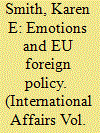

|
|
|
|
|
| Summary/Abstract |
This article assesses the role that emotions play in European Union foreign policy-making. EU decision-making has often been depicted as technocratic and ‘de-dramatized’, yet there are still situations in which emotions can affect the process and outcomes of foreign policy decision-making. Using examples of the EU's responses to crises in Ukraine and Myanmar, the article illustrates that emotions can motivate the taking of particular decisions at particular times. Further, the EU expresses emotions in its foreign policy communications, although its use of emotional diplomacy may not be accompanied by substantive action appropriate to the emotions expressed, thus revealing the existence of an emotions–action gap. The ‘emotional turn’ in foreign policy analysis can open up new directions for research in EU foreign policy, and the conclusion considers other promising avenues for researching emotions and EU foreign policy.
|
|
|
|
|
|
|
|
|
|
|
|
|
|
|
|
| 7 |
ID:
180829
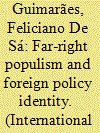

|
|
|
|
|
| Summary/Abstract |
In the last two decades, far-right populists have formed governments all over the world. However, systematic analyses on how far-right leaders recreate their countries' foreign policy identity are still underdeveloped. In this article, we analyse how far-right populist leaders use their conservative identity-set to align with other right-wing governments and how they use the same conservative repertoire to deal with ideological rivals. More precisely, we argue that these leaders tend to overemphasize a deep conservative identity-set towards other far-right populist governments, something we call ‘thick conservative identity’. This profoundly conservative identity-set is composed of three national role conceptions: anti-globalism, nationalism and anti-foe. However, they do not repeat this identity-set towards ideological rivals, preferring to use a more nuanced and contradictory one, something we call ‘thin conservative identity’. The trigger of such difference is the anticipated mutual expectation of conservatism between Ego and Alter, in which Ego mimics Alter's deep conservatism. We use Jair Bolsonaro's alignment with Donald Trump and Bolsonaro's relationship with China as illustrative cases. We use the main concepts of role theory to understand both how conservative alignments are created and how far-right governments deal with ideological rivals.
|
|
|
|
|
|
|
|
|
|
|
|
|
|
|
|
| 8 |
ID:
180838


|
|
|
|
|
| Summary/Abstract |
Global justice theorists have widely discussed how the international intellectual property rights regime (i.e., the TRIPs regime of the World Trade Organization) makes it more difficult to achieve the goal of universal access to generic (and more affordable) vital COVID-19 treatments (including potential COVID-19 vaccines). This article argues that while patents can impose certain barriers to universal access to generic COVID-19 treatments, the TRIPs regime itself is an integral part of an equitable global solution to the pandemic. More specifically, it argues that article 31bis of the TRIPs, in allowing for a cooperation strategy predicated on complementary importing and exporting of vital COVID-19 generic treatments, is key for successful pandemic suppression. By providing a normative interpretative analysis of article 31bis in light of the ethical requirements of global justice, and by responding to possible objections to its core argument, this article substantiates the ideal of multilateral solidarity among nations. In times of crisis—not only a crisis of global public health, but also a crisis of multilateralism—this complementary cooperation strategy that article 31bis allows for shows a way forward in upholding the global common good that the international legal order seeks to safeguard.
|
|
|
|
|
|
|
|
|
|
|
|
|
|
|
|
| 9 |
ID:
180824
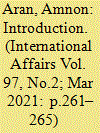

|
|
|
| 10 |
ID:
180839


|
|
|
|
|
| Summary/Abstract |
With the unprecedented COVID-lockdown in 2020, many peace diplomatic efforts turned virtual. This represented a temporary loss of many of the usual practices of peace diplomacy and provided an opportunity to examine micro-dynamics of both virtual diplomacy and face-to-face meetings. Based on interviews with parties and mediators involved in the Syrian and Yemeni peace processes we analyze the affordances of virtual and physical meetings respectively. We find that virtual meetings condition peace diplomacy by broadening accessibility, putting confidentiality at risk, allowing for higher frequency of meetings, often disrupting interaction, but also in some instances equalizing it. The transition to virtual also meetings demonstrated what is lost in the absence of physicality: bodily presence, spending longer periods of time together, the possibility of reconciliatory interaction and sharing informal space. When this is missing, it hampers conditions for what we call the sense of peace, that is, the visceral potential of meeting physically, which we conceptualize to include a sense of understanding, togetherness and trust. We further propose a wider application of this conception beyond peace diplomacy, in the form of diplomatic approachment. Finally, we suggest strategies in virtual diplomacy and discuss how virtual and physical diplomacy may supplement each other.
|
|
|
|
|
|
|
|
|
|
|
|
|
|
|
|
| 11 |
ID:
180833


|
|
|
|
|
| Summary/Abstract |
This article considers how leaders' personality traits change over time. I focus on how leaders become more authoritarian, overconfident and more mistake-prone; how, when and why do leaders ‘break bad’? Temporal evolution of leaders is an important topic given the long tenure of many political leaders and the influence these leaders have over policies, including foreign policies. There is very little work on how leaders' personalities develop and how they interact with changing constraints and opportunities. This article is an agenda-setting review, designed to push foreign policy analysis in new directions. This is especially important given the resurgence in research on personalities and the renewed interest in leaders. Drawing on diverse and multi-disciplinary scholarship on the psychological effects of aging, experience, learning and power-holding, this article develops expectations about leader personality change. I discuss challenges for research in this area, focusing on how ‘bad’ can be conceptualized, and offer specific avenues for future investigations.
|
|
|
|
|
|
|
|
|
|
|
|
|
|
|
|
| 12 |
ID:
180827


|
|
|
|
|
| Summary/Abstract |
Research on political parties and foreign policy has grown in recent years in response to disciplinary and real-world changes. But party research still bears the imprint of earlier scepticism about the role of parties. The result is scholarship which is disaggregated, which avoids difficult cases for parties, and which has focused more on showing that parties matter relative to structural accounts of foreign policy-making. This article takes stock of recent research on political parties, party politics and their role in foreign policy-making. We argue that it is time for party research not only to embrace the question of whether parties matter but also how, when and where they matter. This requires a move away from most-likely cases and the realist foil towards an embrace of the complexity of party positions. Building on International Relations, comparative politics and foreign policy analysis scholarship, we suggest four avenues deserving of greater scholarly focus: 1) ideological multidimensionality; 2) parties as organizations and the role of entrepreneurs; 3) parties as transnational foreign policy actors; and 4) the interaction between parties and the changing global order. We propose how these literatures can help identify new research questions, contribute to theory development and help define scope conditions. This will hopefully help scholars establish benchmarks for judging the efficacy of parties in foreign policy-making.
|
|
|
|
|
|
|
|
|
|
|
|
|
|
|
|
| 13 |
ID:
180831
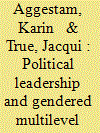

|
|
|
|
|
| Summary/Abstract |
Gender intersects as a major fault-line in increasingly polarized, contemporary global politics. Many democratic states in the global North and South have adopted pro-gender norms in their foreign policies, while other states and populist regimes have resisted the promotion of gender equality and women's rights. This article analyses how political leaders harness gender dynamics to further their power, status and authority to act in foreign policy. While scholarship on foreign policy analysis has emphasized the role of individuals, political leaders and their followers, and of two-level games balancing domestic and international pressures, we advance a novel theoretical concept: ‘gendered multilevel games’. This new concept highlights the gendered dynamics of the problem of agency and structure in foreign policy, which are generated from the interactions between the domestic, international and transnational levels, and reach within and across states. To illustrate the utility of this concept, we analyse foreign policy leadership and the variation in gendered multilevel games in four vignettes: (1) hyper-masculinity and revisionist leadership; (2) normative leadership and gendered nation-branding; (3) compassionate leadership and gendered transnational symbolism; and (4) contested leadership on pro- and anti-gender norms in foreign policy. Importantly, these empirical illustrations show how adept political leaders navigate pro- and anti-gender norms to achieve core and often divergent foreign policy goals.
|
|
|
|
|
|
|
|
|
|
|
|
|
|
|
|
| 14 |
ID:
180828


|
|
|
|
|
| Summary/Abstract |
Over the past decade, we have seen the rise of populist nationalist heads of state across a number of important electoral democracies—all of whom have made some version of the promise to make their countries ‘great again’. However, scholars are divided over whether these leaders' sometimes bombastic rhetoric has consistent or predictable effects on state foreign policy. This article introduces a framework for mapping the effects of populism and nationalism in foreign policy. In doing so, it draws on Essex School discourse analysis and sociological frame analysis to argue that representational crises at the sub-state level increase the popular resonance of ‘sovereigntist frames’ that diagnose the causes of perceived gaps in representation of the ‘authentic’ sovereign community at the international level and enjoin chief executives to resolve these gaps through revisionist foreign policy practices. The ethno-nationalist master frame prescribes policies and practices of lateral revisionism (conflict with neighbours or rival states), the populist frame prescribes systemic revisionism (conflict with allies and the international ‘establishment’), while the ethno-populist frame prescribes omni-revisionism (conflict with both). The article illustrates the effects of these disparate sovereigntist movements across three paired case-studies drawn from Europe, Latin America and the United States. It concludes that nationalism has greater destructive effects for the international system when combined with populism, demonstrating the importance of distinguishing nationalism and populism conceptually in order to isolate their separate and combined effects on foreign policy.
|
|
|
|
|
|
|
|
|
|
|
|
|
|
|
|
| 15 |
ID:
180837


|
|
|
|
|
| Summary/Abstract |
The emergence of a global far right has been seen as a significant development in recent years and as a challenge to wider forms of neo-liberal globalization. While much has been written about its significance and representation, little has been written on either the gendered nature of the far right and the role that women have played as actors within it. Though there still remains a gender gap in terms of the support and participation of the far right, there has been an increasing rise of leaders and figureheads within the respective movements themselves. This article argues that despite the emergence of these women, the far right looks to construct an extreme form of masculinity in which anti-feminism appears as a significant part of its overall strategy. By engaging with both the Gramscian understandings of hegemonic construction and subsequent notions of masculinist hegemony, it argues that the appearance of women both as leaders and ‘organic intellectuals’ within respective national movements allows them to gain greater legitimacy. Rather than ‘feminizing’ or indeed moderating the form of far-right narratives, women had looked to re-inforce such extreme masculinity by adding to existing understandings of anti-immigration, nationalism and in particular of the meaning of ‘anti-feminism’. Thus, recent leaders of far-right political parties appear alongside media columnists and ‘celebrities’ in contributing to the construction of extreme masculinity with the far right.
|
|
|
|
|
|
|
|
|
|
|
|
|
|
|
|
| 16 |
ID:
180836


|
|
|
|
|
| Summary/Abstract |
European states have adopted strict migration policies, such as unlimited detention in Britain, to address increasing anti-immigrant emotions in the context of rising anti-immigrant populism. These state practices prioritize the feelings of insecurity of some population groups towards immigrants whose emotions and insecurities are politically marginalized. Consequently, whose emotions matter in politics intertwines with whose security matters. This article articulates emotions in politics of security as an entitlement, which feed into the question of who ‘merits’ security politically. By focusing on individuals to whom such entitlement is denied in the context of anti-immigrant populism, it investigates how immigrant women ‘feel’ detention and enact their emotions in their own everyday ‘felt’ security. The research is conducted through in-depth interviews with women who experienced detention in Britain. Through the method of ‘listening guide’ adapted from psychology, the research studies their narratives about their emotions before, during and after detention. By bringing together the feminist research on emotions and ‘everyday security’ approaches in International Relations, this analysis contributes to feminist IR and security studies on women's agency in the politics of security, by revealing the importance of emotional dynamics in their everyday ‘felt’ security practices. Therefore, it offers a path for feminist IR and security studies to prioritize those whom anti-immigrant populism aims to silence in the age of populism.
|
|
|
|
|
|
|
|
|
|
|
|
|
|
|
|
|
|
|
|
|